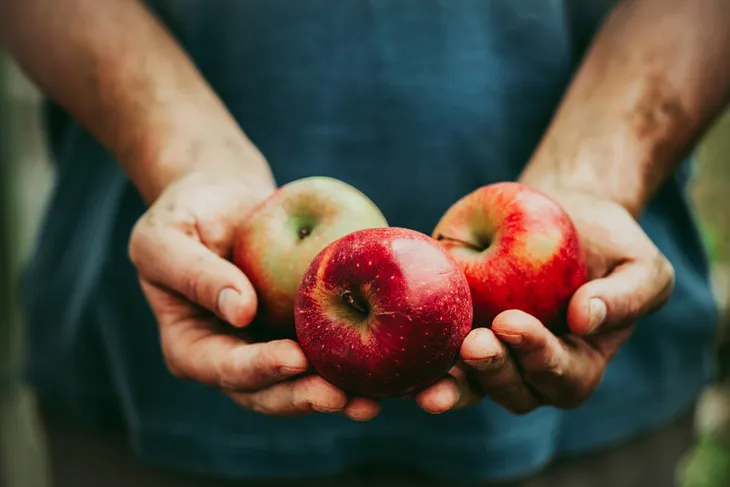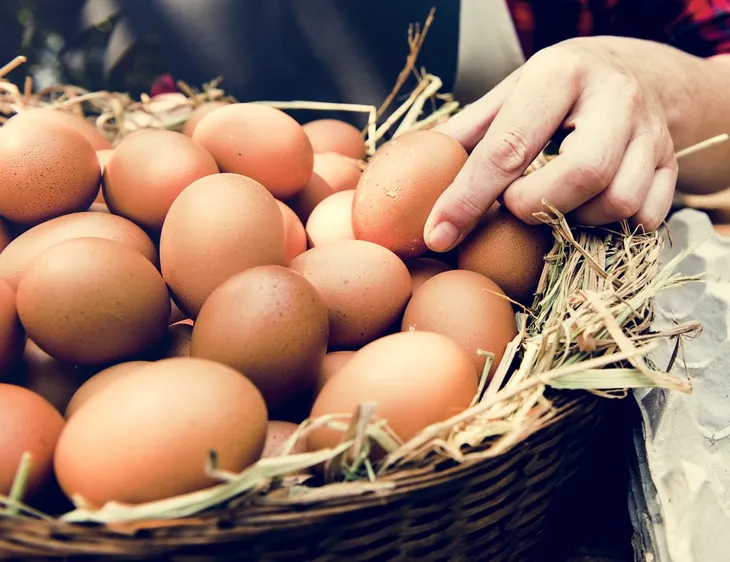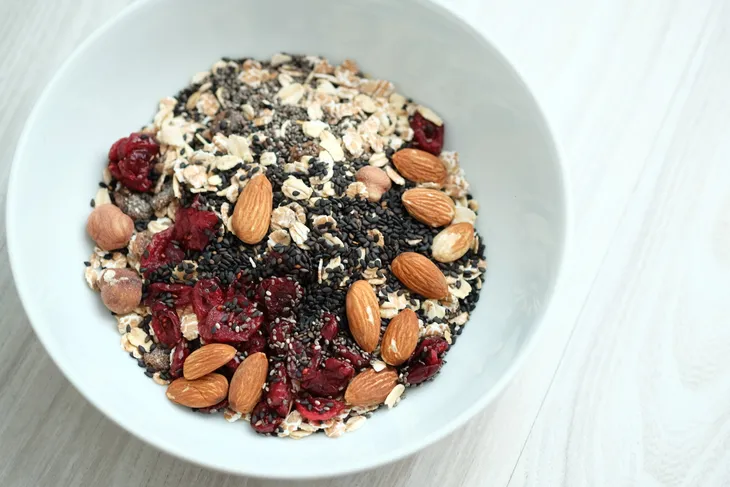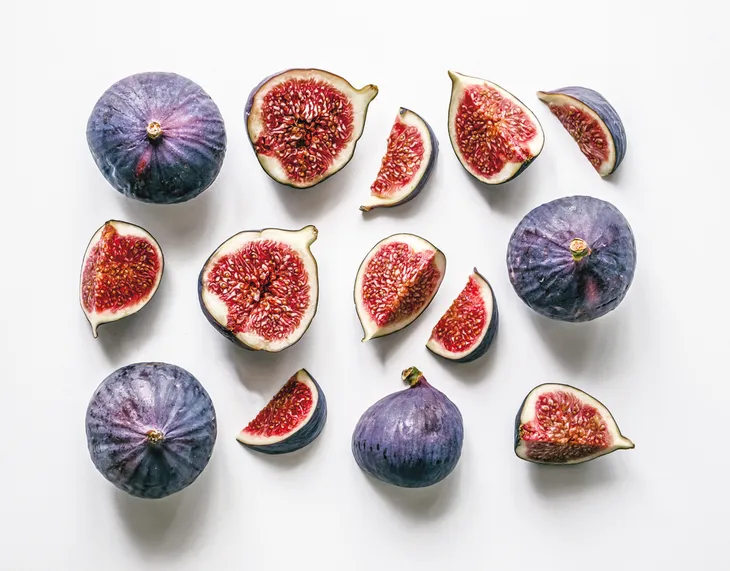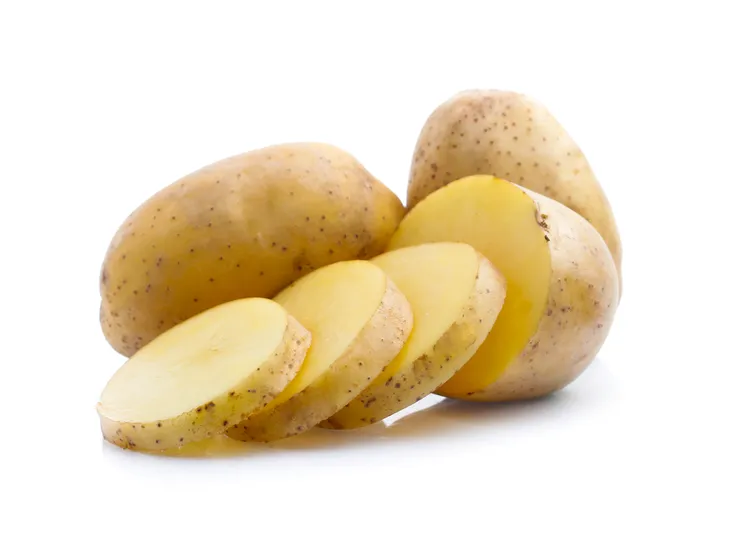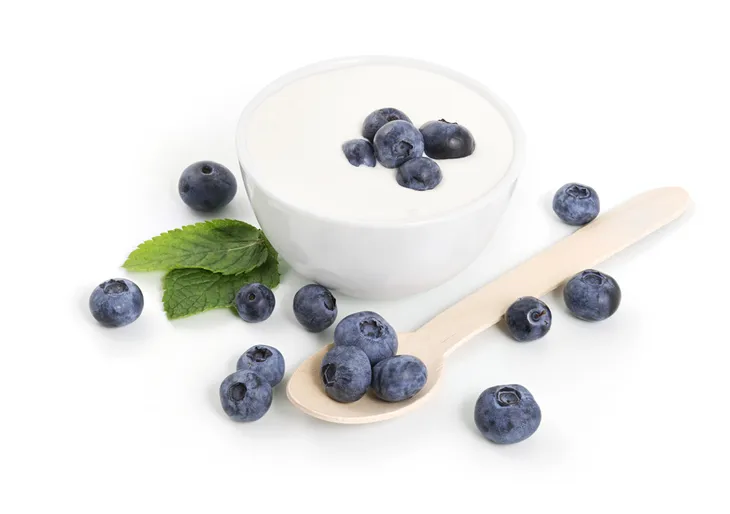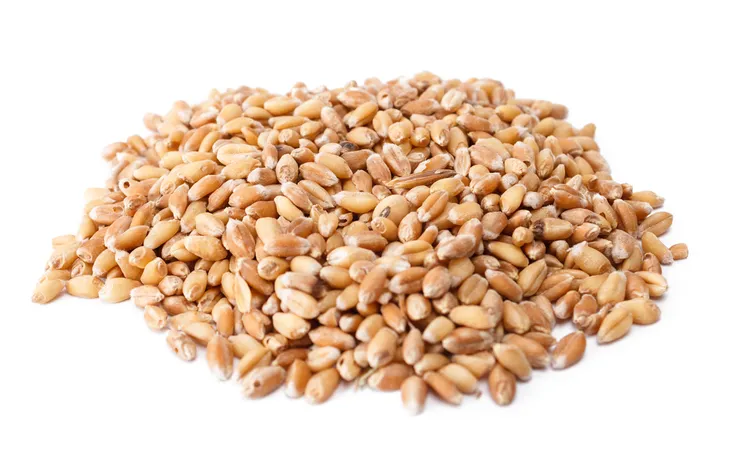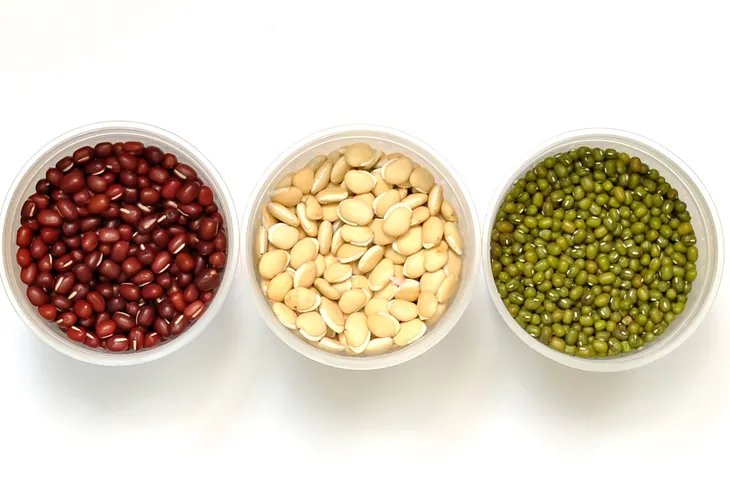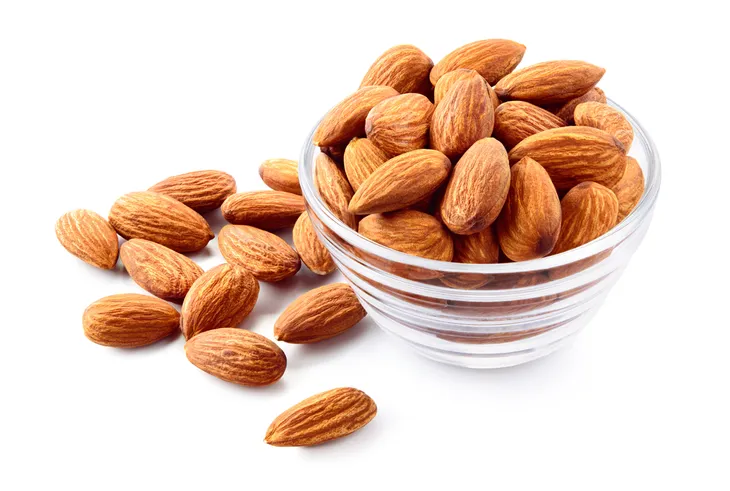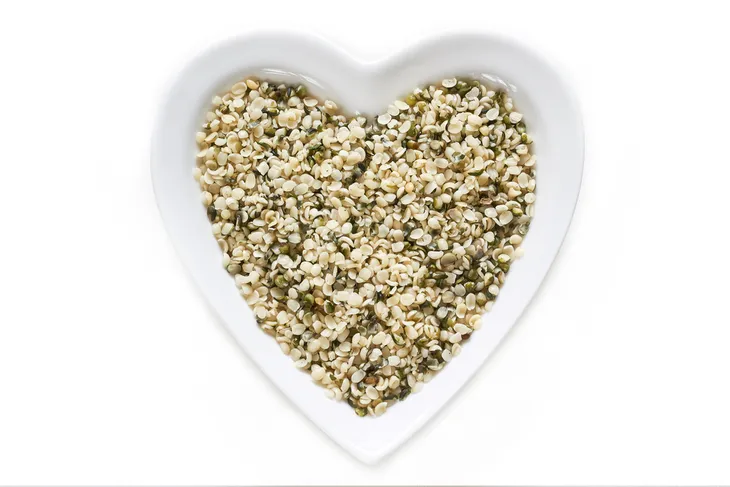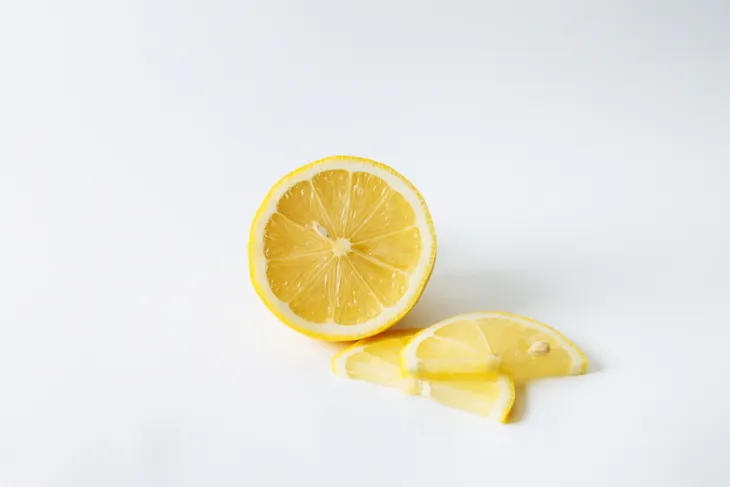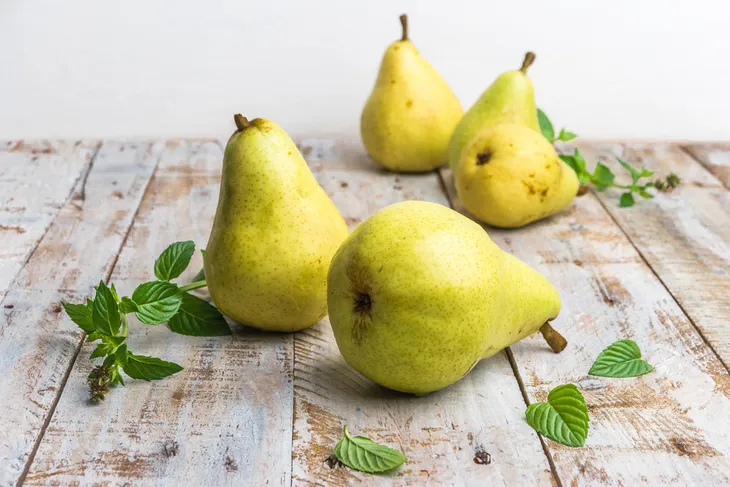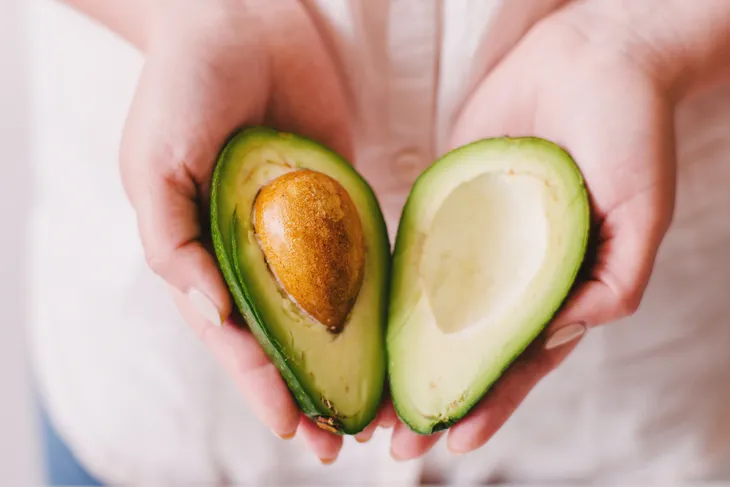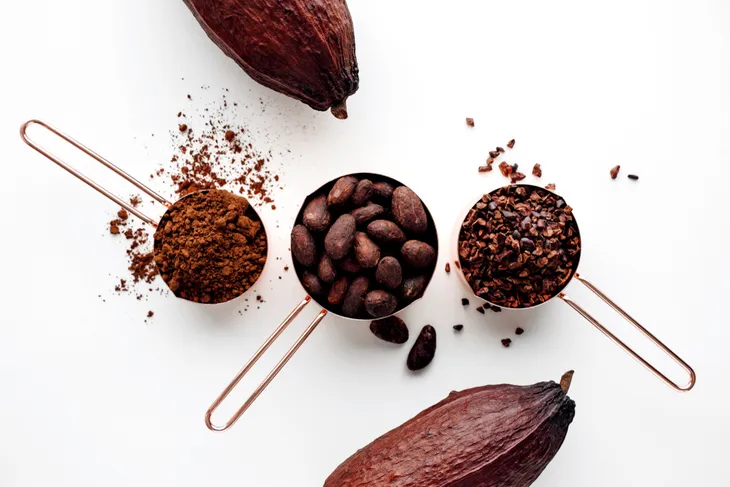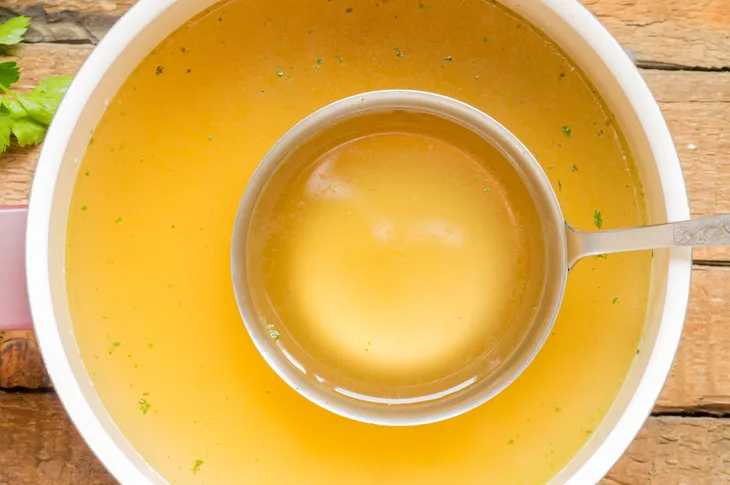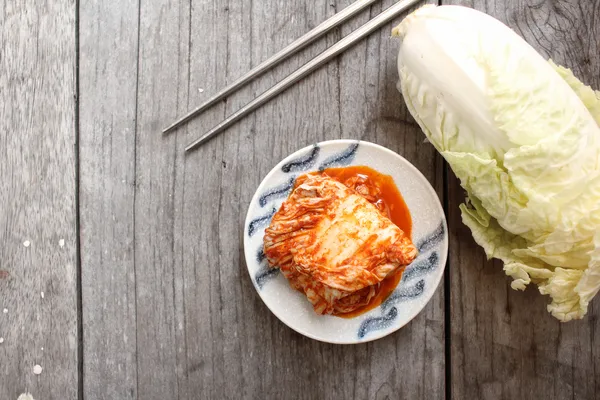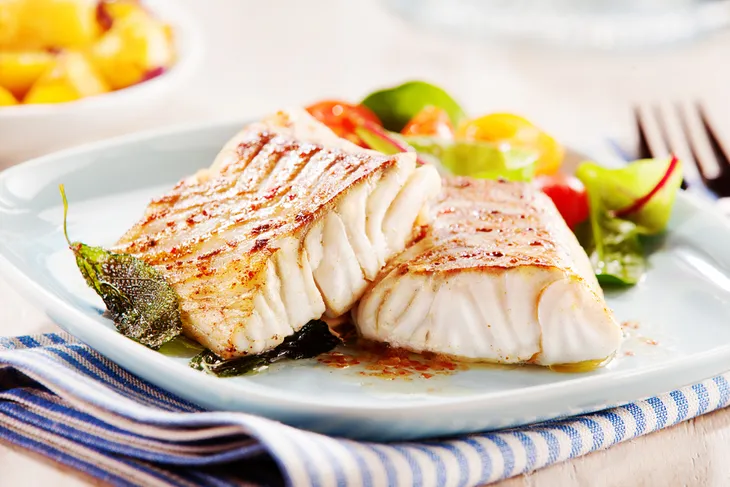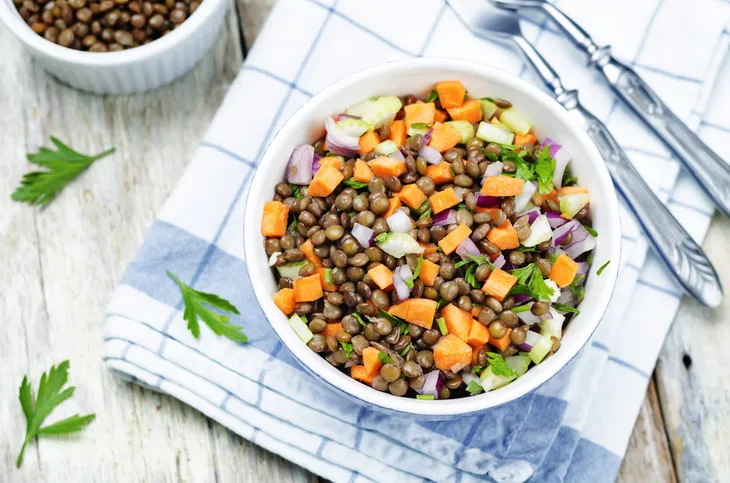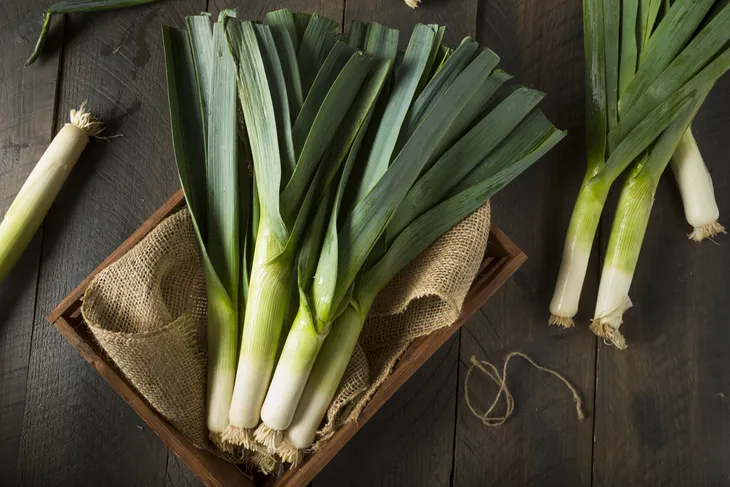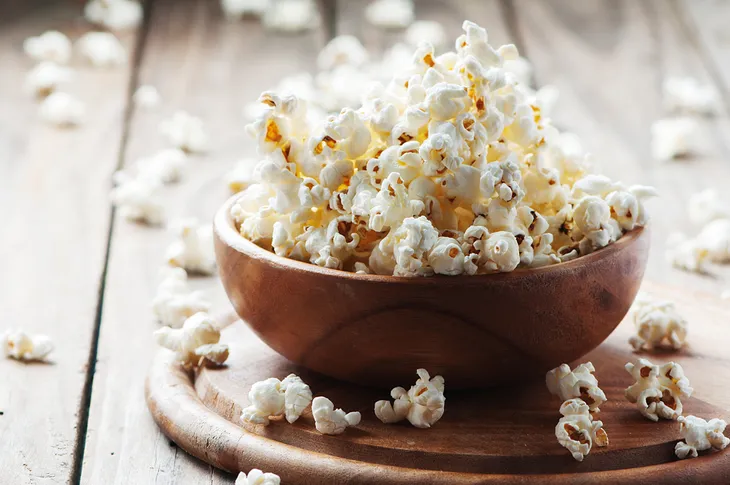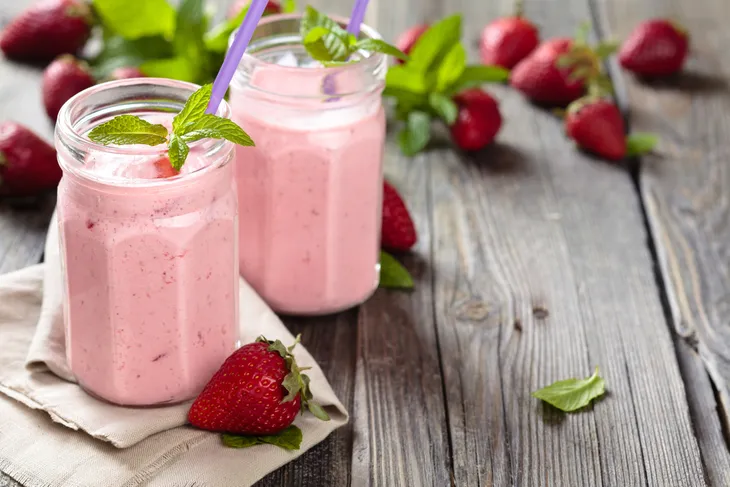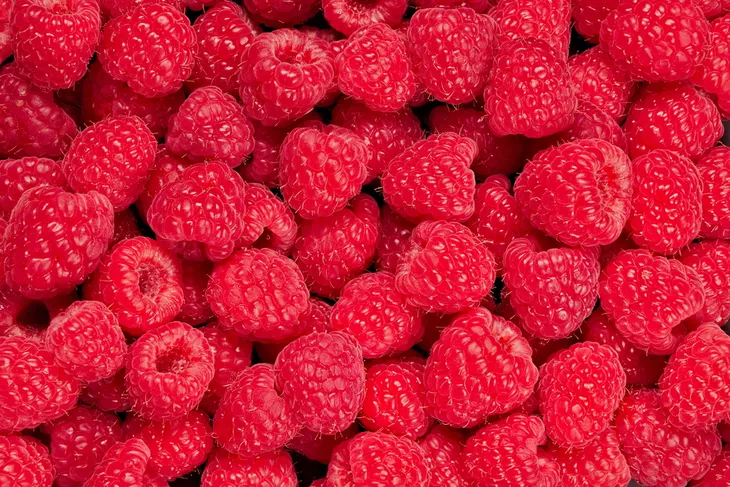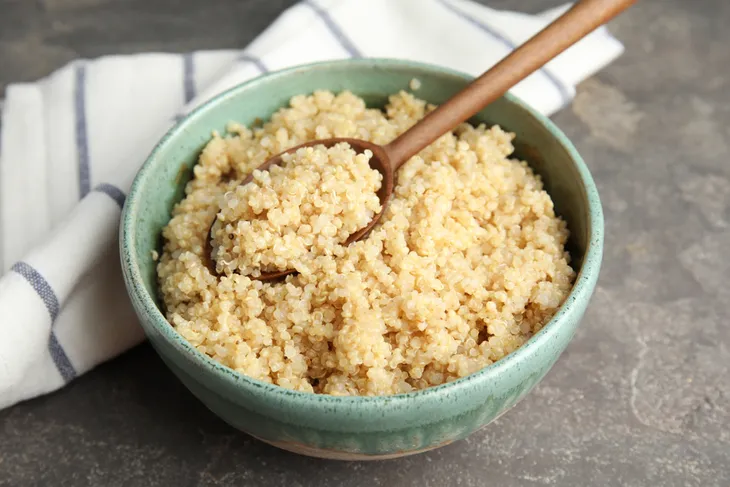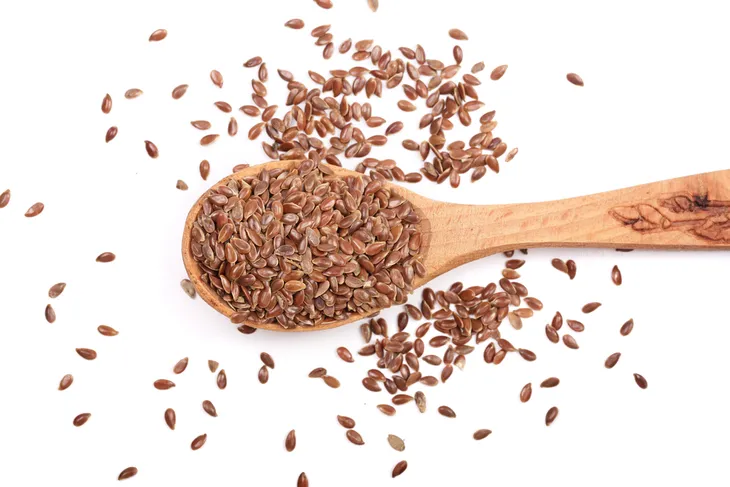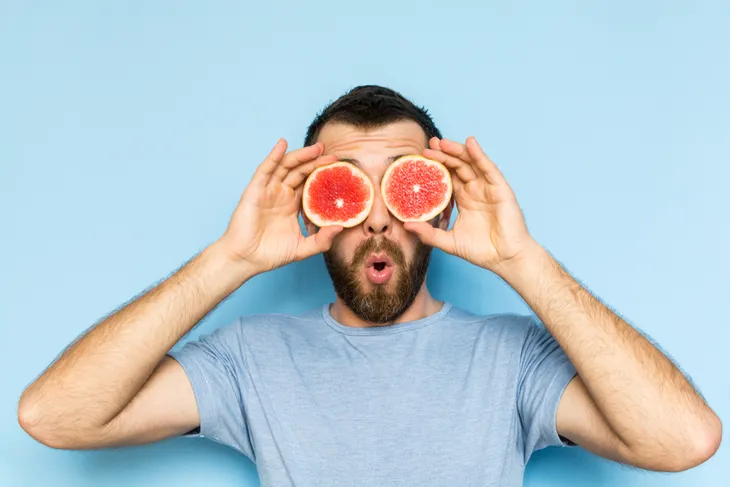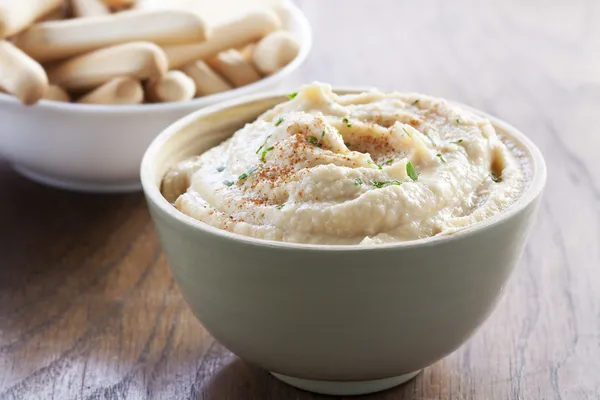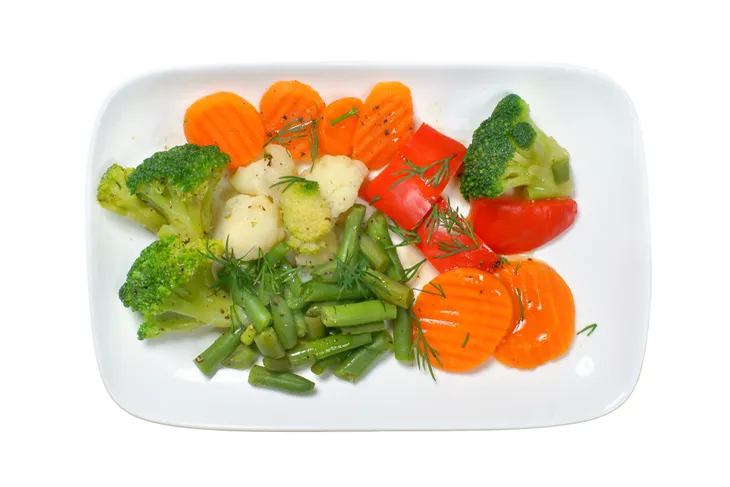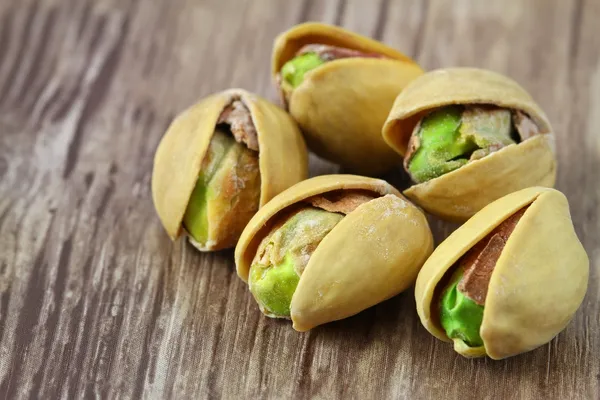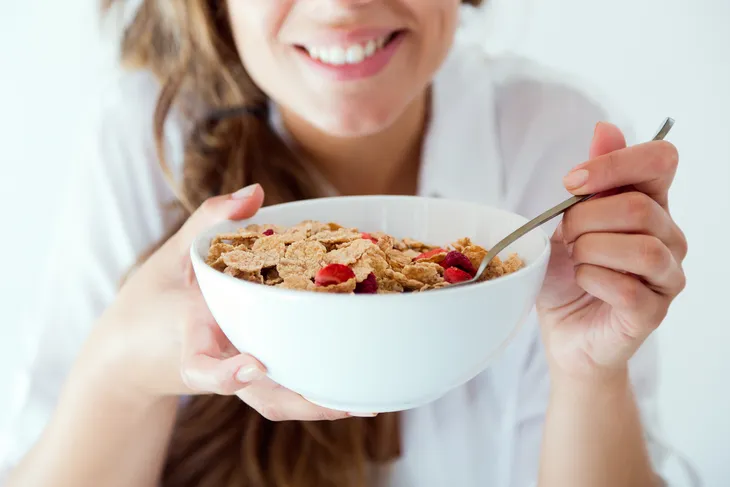To lose those remaining stubborn pounds, many of us just need to tweak our diets and cut our portion sizes. One secret is to incorporate low fat, low calories foods, like these, into your diet. The following 30 filling foods deliver the goods as far as dietary fiber, powerful protein, and essential nutrients so you get more bang for your bite…
Apples
How do you like dem apples—especially since they rank number one on our list of satiating foods. Apples contain a secret-weapon when it comes to slowing digestion and creating that full feeling for longer—it’s called pectin.
According to nutritionists at Tufts University, pectin in a whole apple is more filling than the equivalent amount of fruit in juice. After all it takes effort (just ask your jaw) to devour an apple so your brain and body have adequate time to register a feeling of hunger satisfaction.
Eggs
You don’t have to be shy when cracking eggs (including the yolks) to eat. According to dietary research from Saint Louis University, people who consume eggs for breakfast, eat roughly 330 fewer calories daily compared to those who eat cereal, toast, or bagels for their morning meal.
Food scientists dub eggs the “complete protein,” which refers to the nine essential amino acids contained within a single egg. The Academy of Nutrition and Dietetics, claims this collection of amino acids is what suppresses the appetite and tells your brain and body that you’ve reached food capacity.
Oats
A belly full of oats is a happy belly. Just ask anyone who gobbles down this high fiber breakfast bowl. Oats stall mid-morning snack attacks because they absorb liquid (i.e., water, milk, almond milk) like a sponge—meaning you’ll eat less calories, but feel full until lunchtime.
The secret of slow digesting oats is that they take much longer to work their way through the digestive system, which compared to the quick fix you’ll get with most breakfast cereals, quells hunger pangs and regulates blood sugar so you’re satisfied for much longer.
Figs
Not only are they naturally sweet if you’ve decided to cut out refined sugars in favor of natural sweetness, figs are thick and fleshy for a satiating bite. That means you’ll get sticky-sweet without the added calories.
On top of a caloric cut, figs are a great source of dense, filling fiber. For instance, one fig clocks about 37-calories and 1 gram of fiber to stall the release of sugar into the bloodstream and prevent hunger cravings from spiking shortly following meals.
Potatoes
Potatoes have a bad rap. However, it’s all in how you prepare the vegetables. Sure, potatoes are a starchy bunch, but a healthy boiled, baked, or grilled potato (not fried) will satisfy hunger for quite some time.
In fact, potatoes squelch hunger for about the same duration as brown rice or whole wheat bread—at far less carbohydrates than both. But don’t shun a grilled, baked, or boiled potato from your plate. If you do, you’ll be missing out on a ton of nutritious fiber and vitamin B6, potassium, copper, vitamin C, manganese, niacin, and phosphorus.
Greek Yogurt
Hark the Harvard researchers who tout Greek yogurt as “the single best food for shedding pounds.” During a study that monitored the weight and dietary habits of 120,000 people over a 20 year period, Greek yogurt was found to balance blood sugar (and curb cravings) and satisfy hungry tummies for longer.
In fact, the same study found that those who opted for protein-packed Greek yogurt, shed unwanted, extra pounds without changing any other habits (i.e., diet or exercise). Keep in mind that Greek yogurt contains double the protein, no whey, and a sliver of the sugar compared to any other type of yogurt.
Wheat Berries
Have you tried wheat berries? The whole-wheat kernels do get a lot of notice as a superfood, and similar to quinoa (another super food), wheat berries are super rich in both protein and fiber compared to most other grains.
To give you an idea, a serving of wheat berries contains roughly 6-grams of protein and 6-grams of fiber—meaning twelve times the appetite satiating power. Foods like wheat berries and quinoa trigger the release of ghrelin, a hormone that indicates to the brain that we’re full.
Beans
Beans, beans might be good for your heart, but they’re also ideal for whittling your waistline. Beans fill you up because they absorb a lot of water during the cooking process—for example when incorporated into stews, soups, and sauces.
On top of that, beans are also high in fiber that fill you up quick and tell the brain that you’re full. Beans also provide resistant starch, a type of carbohydrate that delays the release of sugar into the bloodstream to provide feelings of satiation.
Almonds
It’s difficult to deny that a small handful of almonds provides the perfect snack. In fact, Tonia Reinhard, a registered dietitian and author of the book Superfoods, credits a 1-ounce almond snack (that’s roughly 22 nuts) with keeping appetite satisfied.
Almonds keep hunger under control and snack attacks at bay with a decent dose of beautifying vitamin E (for glowing skin, shiny hair, and strong nails), healthy monounsaturated fats, protein, and dietary fiber.
Hemp Hearts
You’ve likely noticed this natural food store item cropping up in regular grocery stores more and more. Don’t worry, I’m not recommending you eat marijuana! Hemp—while related to refer—is not illegal to buy or blend these nutty seeds into your oats, smoothies, or yogurt parfait.
According to Health.com, hemp hearts pack more fiber than flax or chia, 2 other “super foods” that get a lot of buzz, plus these hearts are great for your heart thanks to plenty of essential fatty acids within.
Lemons
You’ve likely heard something, somewhere about the benefits of drinking lemon water for health. A lot of that citrus celebration stems from the alkaline-forming aids of lemon, which means this fruit can help improve the pH balance in the intestines, and as a result also improves digestion.
Although the verdict is still out on drinking lemon water as a weight loss aid, several studies show that improved digestion often improves bowel movements, lessens hunger cravings, and has an overall slimming effect.
Pears
While you may be trying to shed your pear shape with the help of a more nutritious, well balanced eating plan, the actual fruit itself can help aid your weight loss efforts.
Firstly, pears are packed with fiber—to the tune of roughly 6-grams per fruit, according to a study from Washington State University. Secondly, the sweet, juicy pear offers a healthy dose of antioxidants. The same Washington State study claims pears improve healthy gut bacteria in the colon, preventing type 2 diabetes and cardiovascular disease, because they’re packed with non-digestible dietary fiber, which aids the stability of normal metabolic processes (i.e., like appetite).
Avocado
Are you avoiding avocado because of it’s high fat reputation? Well, it’s time to embrace this velvety soft fruit (yes, it’s a fruit) because it contains healthy, plant-based fats that help improve cardiovascular health.
Avocado is rich in, you got it, dietary fiber, which according to research in the Nutrition Journal, fills you up and prevents hunger cravings, while reducing anti-inflammation in the body and even lowering the risk and pain of arthritis.
Cacao
Now I can’t eat most regular chocolate because I have a casein allergy (to cow milk protein) and even many forms of dark chocolate contain milk ingredients. So I came upon cacao quite accidentally while trying to recreate or substitute for chocolatey goodness in baked goods.
Enter the wonder that is cacao, which contains the same heart-healthy, antioxidant, and mood-enhancing goodies as dark chocolate without the sugar. In fact, New York-based registered dietitian, Ashley Koff, says cacao (or dark chocolate containing at least 70-percent cacao) provides a natural stress reliever, thanks to calming brain chemicals like serotonin and energy-boosting theobromine.
Broth-Based Soups
Chicken rice soup, minestrone soup, lentil soup, and tomato basil soup…they all have one thing in common. These comforting bowls are broth-based, which makes them high in water content and rich in fiber.
Add some lean protein in the form of chicken breast, lentils, or beans and your lunchtime thermos will keep you satiated for the remainder of the workday. According to a European Journal of Clinical Nutrition study, pureed or blended broth-based soups keep you full because they digest more slowly than solid meals and chunkier soups. Make sure it is homemade soups as most canned or premade soups are high in sodium.
Kimchi
I’ll admit the first time I smelled kimchi I wasn’t a fan. However, tasting this fermented, Korean staple was an entirely different story. Similar to sauerkraut, kimchi contains a ton of beneficial probiotics, which make for a happy gut and digestive system.
In fact, the digestive aiding benefits of kimchi are revealed in research from Korea’s Ajou University School of Medicine, Department of Endocrinology and Metabolism, which notes that maintaining a happy, healthy gut aids in insulin resistance, inflammation, and fat loss.
Fish
My dad, a born and bred Newfoundlander (from Canada’s fishing capital) always made fish several times throughout the week for dinner. I’m not sure if he knew the appetite satisfying, lean protein benefits he was providing for his family. Likely, as dad knew best.
Thankfully, dad’s preference for fish over beef and even pork, ensured regular meals packed with lean protein, healthy omega-3 fats, and amino acids (i.e., L-glutamate). Umaimi is often referred to as the “fifth flavor”, tapping into feelings of appetite satisfaction.
Lentils
Lentils are not only extremely versatile (i.e., as part of stews, soups, chilli, and even baking), this hearty legume helps keep appetite satiated for the duration after a meal, so you won’t feel the need to snack on sweets in between.
Plus, if you’re trying to reduce your starchy carbohydrate intake, a study from the journal, Obesity, explains that incorporating one serving of lentils into your meal will keep you 31-percent fuller after dining compared to fast-digesting foods (i.e., pasta and bread).
Leeks
Leeks, the vegetable often mistaken for an onion in dishes, can improve gut health, prevent hunger cravings, and improve overall digestion and metabolism. According to data from the American Gut Project (AGP), lightly steamed, sautéed, or raw leeks in your recipes have tons of benefits, both mentally and physically.
For one, the AGP notes the dietary fiber in leeks, which improves healthy bacteria (i.e., prebiotics like cellulose and fructan) in the colon, and aids digestion. Don’t forget that as leeks improve the diversity of bacteria in your happy gut, they also keep the mind less stressed, which leads to better satiety and overall mood.
Popcorn
We must be careful with this one because we’re not saying that the big bucket of popcorn they sell at the movie theatre is going to help with weight loss (it’ll actually do the opposite). That popcorn is coated in butter and salt. We’re talking about some air-popped, natural, no salt or butter popcorn. It’s also something you’d want to indulge in once in a while on a movie night, not every day.
This tasty treat helps with weight loss because it makes us feel full so we won’t eat more than we need. “Popcorn takes up more room in your stomach, and seeing a big bowl of it in front of you tricks you into thinking that you’re eating more calories and that you’ll feel full when you’re finished,” says Barbara Rolls, PhD, author of The Ultimate Volumetrics Diet to Time magazine.
Smoothies
Smoothies are a perfect go-to breakfast meal for those who are short on time, need something on the go, or just don’t like eating food in the morning. These drinks are basically liquid meals which is why they need to be nice and filling. Health.com looked at a study from the University of Penn State which found that “while most beverages don’t satisfy hunger very well, drinks blended full of air are an exception: they cause people to feel satiated and eat less at their next meal.”
In order to make sure smoothies stay healthy, don’t buy them. Make one at home and make sure it’s not loaded with sugar. You can find lots of healthy recipes that are loaded with fruit, veggies, some almond milk and a small scoop of yogurt.
Raspberries
You’re probably happy to see these little berries on this list because they’re so tasty! Raspberries beat out a ton of other fruits for a spot on this list because they’re loaded with fiber which is super important when it comes to weight loss because it keeps us nice and full. When our appetite is satisfied we’re less prone to snacking on empty calories.
“Sun-ripened raspberries taste sweet, but are surprisingly low in sugar (5 grams for a whole cup) and high in fiber (8 grams per cup),” write Health.com. You can eat these berries on their own or toss them into a bowl of greek yogurt, a smoothie, or some oatmeal.
Quinoa
Quinoa is like the avocado, it seemed to boom in popularity within the past decade. It has been touted by the health community as a great substitute for other grains like rice or couscous, especially because it’s “a gluten-free, vegan source of ‘complete’ protein, with 8-grams per cup cooked.
It also has almost double the fiber of brown rice, which gives it extra hunger-squashing power,” says Cynthia Sass, MPH, RD, a contributing editor for Health.co. The source also notes that while it’s treated like a grain, it’s actually a seed that’s related to other foods like beets, spinach, and even chard.
Flaxseed
Flaxseeds might be small, but they’re mighty! These little seeds are great for holding off hunger and a great source of fiber for people who are looking to remain full and lose weight. “In my experience, both personally and with my clients, seeds are incredibly filling and satiating,” says Cynthia Sass to Health.com.
The source cites a study by the University of Copenhagen in Denmark which found that “meals supplemented with 2.4-grams of flaxseed fiber promoted a great feeling of satiety and fullness in men compared to meals without the fiber,” writes Health.com. All it takes to get the effects of this superfood is 1-tablespoon to get 2-grams of polyunsaturated fatty acids, 2-grams of fiber, and some omega-3 fatty acids.
Grapefruit
This tangy citrus fruit is an acquired taste because it has some bitterness to it, but those who do enjoy it, love it! Those people are also getting some pretty great health benefits out of it too. Openfit cites research from California’s Scripps Clinic which found that eating just half a grapefruit (or drinking 8-ounces) before each meal can encourage weight loss. The participants in the study lost up to 4-pounds in just 12-weeks.
So how does it work? Studies suggest that grapefruit “is a potent source of pectin, a soluble fiber that can help slow digestion and suppress appetite, leaving you feeling fuller longer, and reducing fat storage in the body. But you’ll only find pectin in the pulp, so drink it pulpy,” writes Openfit.
Hummus
Hummus is a great alternative to those other unhealthy, creamy vegetable dips like ranch or blue cheese. Men’s Journal notes that hummus has about a “fraction of the calories of higher-fat sour cream or mayo-based dips.”
Another great quality is that it’s made from chickpeas which are packed with protein which helps keep us full for longer periods of time. Also because we tend to use it to dip our carrot sticks, celery, or other veggies so it tends to encourage us to eat healthier.
Just be mindful when picking out a hummus. Read and compare labels in order to choose the healthiest brand possible, or better yet, make your own!
Non-Starch Vegetables
You can never go wrong when it comes to eating vegetables. But the reason we don’t reach for vegetables when we’re hungry is because a lot of them don’t leave us with that full feeling. Even though they might taste and feel nice and light, there are a few veggies that will actually fight off hunger better than anything else.
According to Men’s Journal, non-starchy vegetables like cucumbers, carrots, zucchini, broccoli, cabbage, and celery are the best because not only are they low in calories due to their high water content, they’re also loaded with fiber.
Men’s Journal talked to Tanya Zuckerbrot, RD, who explained that fiber content in a food is important because it is what gives us a more long term full feeling. “Fiber also adds bulk to foods, which gives you the satisfaction of chewing, plus the feeling of a full stomach,” she says.
Pistachios
Just like popcorn, we have to be careful with this one. There are plenty of packages of pistachios that are not healthy because they’re coated in salt. Also, nuts should be enjoyed in moderation because they are high in fat. Luckily pistachios are “one of the lowest-calorie and lowest-fat nuts out there,” writes Men’s Journal. To get a better idea of how much healthier pistachios are than other nuts, Men’s Journal points out that 28 peanuts or 22 almonds will amount to the same amount of calories as 1-ounce of pistachios.
In addition to their low calories, pistachios contain lots of healthy fats. “Almost all of the fat found in pistachios are heart-healthy mono- and polyunsaturated fats, which when consumed in combination with a healthy diet may reduce the risk of heart disease,” says Tanya Zuckerbrot, RD, author of The Miracle Carb Diet: Make Calories & Fat Disappear — with Fiber!
Cereal
There’s a reason we eat cereal for breakfast in the morning — it’s because it’s nice and filling! This breakfast staple is eaten first thing in the morning to help satisfy our hunger and last us until the afternoon. When it comes to picking cereals that are healthy, look for brands that are high in fiber. This should go without saying, but don’t buy those sugary cereals geared towards kids.
“High fiber whole-grain cereals not only provide ample fiber, but are also loaded in B vitamins, antioxidants, and trace minerals such as iron, zinc, copper, and magnesium,” says Tanya Zuckerbrot, RD when talking to Men’s Journal.

